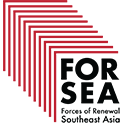Social commentators tend to attribute great importance to elected officials in the United States. However, beneath the turbulent and highly rhetorical politics, private corporations and public institutions in the US have pursued fairly consistent policy-level linkages with Asian-Pacific nations that seek to preserve American geostrategic dominance in this highly important area. Institutional power thus limits the impact of political change.
Speaking on the issue is Mesrob Vartavarian, a Visiting Fellow at Cornell University’s Southeast Asia Program. He studied history at UCLA (BA/MA) and Cambridge (PhD) and began his career as a scholar of early colonial South Asia but has since shifted his research focus to modern Southeast Asia with an emphasis on the Philippines. Mesronb is currently working on a monograph-length study of the Philippine military after Marcos.
-
- Introduction
- A short history of American power in the pacific
- The Cold War and significant changes
- Exploitation of resources in Southeast Asia
- How Southeast Asian nations benefited from their relations with the United States
- China’s rise and the Asia Pacific
- America’s military cooperation with Southeast Asian allies
- The pivot to China in Southeast Asia
- Biden and America’s geopolitical policies
- Final thoughts

